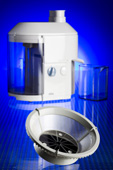Since June 1, 2009, BASF is offering three new products in Europe in its line of styrenic specialties approved specifically for food contact applications. These are the ASA grades Luran S 777 K FC, Luran S 757 G FC and Luran S 797 S FC (ASA: acrylonitrile-styrene-acrylic ester copolymer). As with the engineering resins introduced in 2008, the abbreviation FC stands here for food contact. The reason for introducing the new products can be found in the GMP regulations established by the EU for materials that come into contact with food and which went into effect in August 2008. (GMP: Good Manufacturing Practice)

For toothbrushes and juicers
For the three new Luran S grades, formulations and manufacturing processes were modified to come into compliance with the new legal requirements. While the easy-flowing and tough Luran S 777 K FC represents a basic material for a wide range of applications, Luran S 757 G FC offers high stiffness and strength in conjunction with good flow characteristics. The Luran S 797 S FC grade is characterized by especially high impact resistance. Classic fields of application for Luran S include household appliances such as coffee makers, juicers and microwaveable dishes as well as toothbrushes. The most important product properties for these applications are high thermal stability, good chemical resistance along with exceptional resistance to aging and yellowing.
The new GMP regulations of the European Union
On August 1, 2008, regulation no. (EG) 2023/2006 "On Good Manufacturing Practices" (GMP) went into effect in the European Union. It is part of the European framework regulation 1935/2004/EC governing contact of everyday articles with food. The objective of these laws and regulations is to eliminate, at every step in the supply chain, impurities in food that could harm consumers. According to the GMP regulation, an enhanced quality assurance and process control system must be in place for plastics that come into contact with food. For many years, BASF has produced resins used in food contact applications to a higher safety standard. However, the new regulation requires the resin manufacturer to select and additionally qualify special raw materials and take more extensive measures regarding documentation and quality assurance than was the case previously. BASF provides its customers with the corresponding EU-compliant written confirmations.